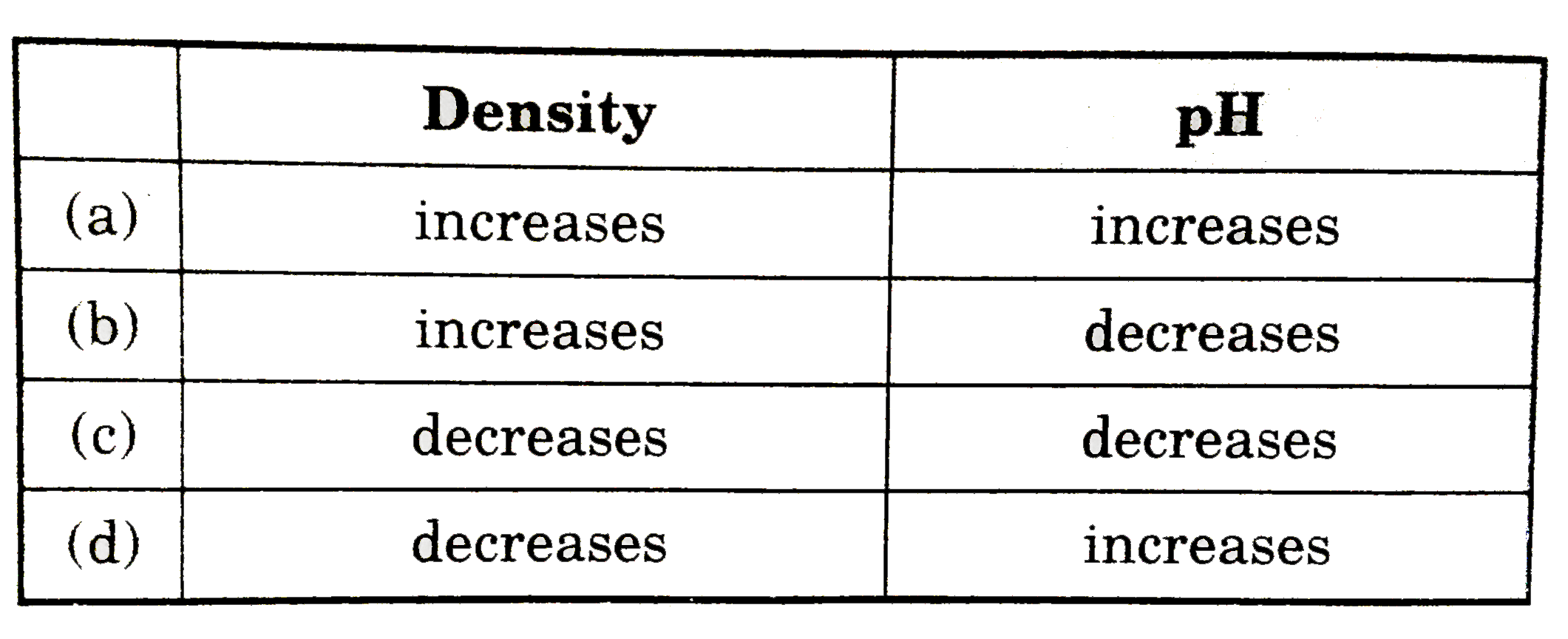The electrode reactions for charging of a lead battery are :
PbSO4+2e→Pb+SO2−4
PbSO4+2H2O→PbO2+SO2−4+4H++2e
The electrolyte in the battery is an aqueous solution of H2SO4. After this battery has been charged:
the sulphuric acid will be more concentrated
the sulphuric acid will be less concentrated
the concentration of H2SO4 will be unchanged
H2SO4 will have been completely decomposed
The correct Answer is:A
Topper's Solved these Questions
- MISCELLANEOUS (TOPICS OF GENERAL INTEREST)BOOK - OP TANDONCHAPTER - MISCELLANEOUS (TOPICS OF GENERAL INTEREST)EXERCISE - SET-II: Obejctive Questions
25 Videos
- MISCELLANEOUS (TOPICS OF GENERAL INTEREST)BOOK - OP TANDONCHAPTER - MISCELLANEOUS (TOPICS OF GENERAL INTEREST)EXERCISE - SET-III: Single Digit Answer Type Questions
20 Videos
- MISCELLANEOUS (TOPICS OF GENERAL INTEREST)BOOK - OP TANDONCHAPTER - MISCELLANEOUS (TOPICS OF GENERAL INTEREST)EXERCISE - SET-I: Objective Questions
19 Videos
- INTRODUCTION TO ORGANIC CHEMISTRY BOOK - OP TANDONCHAPTER - INTRODUCTION TO ORGANIC CHEMISTRY EXERCISE - SINGLE INTEGER ANSWER TYPE
4 Videos
- OXIDATION AND REDUCTION (REDOX REACTIONS)BOOK - OP TANDONCHAPTER - OXIDATION AND REDUCTION (REDOX REACTIONS)EXERCISE - SECTION V
3 Videos
Similar Questions
The electrode reactions for charging of a leas storage battery are :
PbSO4+2e−=Pb+SO2−4
PbSO4+2H2O=PbO2+SO2−4+4H+2e−
The electrolyte in the battery is an aqueous solution of sulphuric acid. Before charging, the specific gravity of the liquid was found to be 1.11 (15.7% H2SO4 by weight). After charging for 100 hours, the sp. gr. of the liquid was found to be 1.28 (36.9% H2SO4 by wr.). If the battery contained two litres of the liquid, calculate the average current used for charging the battery.
NB. (e−) denotes electrons. Assume that the volume of the battery liquid remained constant during charging. 1 faraday = 96500 coulombs.
View SolutionPb(NO3)2+H2SO4→PbSO4⏐↓+2HNO3
View Solution
Knowledge Check
The electrode reactions for charging of a lead battery are
PbSO4+2e−→SO2−4+Pb
PbSO4+2H2O→PbO2+SO2−4+4H++2e−
The electrolyte in the battery is an aqueous solution of sulphuric acid after the battery has been charged.AThe sulphuric acid will be more concentratedBThe sulphuric acid will be less concentratedCThe concentration of sulphuric acid will be unchangedDSulphuric acid will have been completely decomposedPb/PbSO4_((s)),SO−24(aq)
Pb(s)+SO−24⇔PbSO4(s)+?Ae−B3e−C2e−Dno electronWhich of the follewing aqueous solutions of H2SO4 has 4.9 g of H2SO4 ?
A500 mL of 0.1 M H2SO4(d=1.5gmL−1)B250 mL solution of density 2 g mL−1 which is 49% (w/w)C10 g solution which is 49% (w/w)DSolution having 500g water with molality 0.1 mol kg−1
Pb(NO3)2+H2SO4→PbSO4⏐↓+2HNO3
View SolutionThe equation for one of the half-reactions in a lead storage battery is :
PbO−(2)+4H++SO2−4+2e−→PbSO4+2H2O
What happens to the properties of the electrolyte as this

View SolutionPbCl2↓+H2SO4⇔PbSO4↓+2HCL
View SolutionPb(NO3)2+H2SO4→PbSO4⏐↓+2HNO3
View SolutionIn the reaction,
2FeSO4+H2SO4+H2O2→Fe2(SO4)3+2H2O
The oxidising agent is
View Solution
